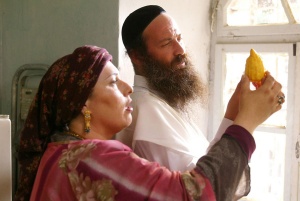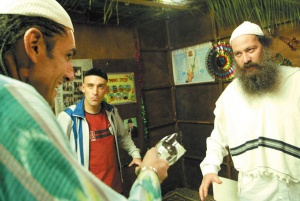Yet Another Test: Ushpizin, the Movie
“And God tested Abraham…” It seems that He hasn’t stopped testing the Jewish people ever since. Abraham already had nine trials to boast of, Isaac was sorely tested in choosing between his two sons and Jacob stoically withstood the test of losing his favorite, Joseph. The Children of Israel famously endured ten trials, all of which turned out fairly disastrous (Arachin 15a). Nonetheless, God is patient, continuing to forgive us even as He examines us and sends more tests. Ushpizin, a new Israeli movie by Gidi Dar, depicts just such a test. Happily both the movie and the main characters pass with flying colors.

This film is a “unique collaborative effort” between Israel’s hareidi and secular communities. Gidi Dar is a secular director, producer, screenwriter, actor and cinematographer who joined forces with a longtime friend, Shuli Rand, a ba’al teshuvah who ten years ago gave up a successful acting career. They have made a film that explores the nature of piety, faith and Divine intervention. Rand wrote the screenplay and engineered the feat of filming in the hareidi neighborhoods of Beit Israel and Mea Shearim strictly according to halacha. Perhaps most intriguingly the film attempts to bridge the divide that looms between the secular and the religious worldviews.
The film rises above stifling stereotypes to present the complexities of hareidi life. Rand’s Breslov Hasidim are a deeply religious and closed community that decidedly have feet made of clay. The stern hierarchal nature of community is matched with all too human passions and angers that erupt when pious hospitality takes a wrong turn. The authenticity in depicting hareidi life (there doesn’t appear to be one fake beard or payos in sight) is accomplished with sophisticated direction and breathtaking cinematography.

Ushpizin opens with the examination of an esrog. The metaphor of examination is well taken as we are introduced to Moshe, a ba’al teshuvah and his wife Mali (played by Rand’s actual wife Michal Bat-Sheva Rand). They are so poor that Mali hides from the landlord and Moshe has no idea how he will obtain the considerable funds to build a succah or buy an esrog for the upcoming yom tov. They do what Jews do when faced with the impossible, they fervently pray and their squalid poverty is alleviated at the last moment by what they perceive as a miracle, anonymous charity of one thousand dollars. The neat trick the director has pulled off is that it is entirely feasible for the viewer to understand this “miracle” as either a fortuitous chance or Divine blessing. What becomes increasingly clear is that it is but the beginning of an awesome test of Moshe and Mali’s marriage and Moshe as an individual. His good fortune allows him to purchase a prize esrog, “the diamond,” and construct a succah just in time. Almost simultaneously his past comes back to haunt him in the form of two escaped convicts, Yosef (a friend from the old days) and Eliyahu. They are, of course, the surprise ushpizin, guests normally thought of as from our patriarchal ancestry but here metaphorical messengers to test the piety and conviction of Moshe and Mali. Exactly how these guests are treated by the besieged couple and the consequences that unfold form the heart of the narrative.

The performances are finely nuanced in technique and character insight as the story shifts between the sacred and profane. The breathtaking complexity of Shuli Rand (he won Best Actor Award at the Israeli Academy Awards) is complemented by Michal Bat Sheva Rand’s warmth and pathos. Both Shaul Mizrahi (Eliahu) and Illan Gannai (Yosef) are able to milk the fast paced absurdist situations for equally comedic and dramatic effect. Perhaps most poignantly they come to represent the secular world that has invaded the cloistered courtyards of Hasidic piety. The fact that they are not portrayed as inherently evil, rather just a bit out of their element, reflects the evenhanded intent of the film.
In Jewish tradition the original ushpizin were in fact the three strangers who visited Abraham and Sarah. Their heartfelt kindness, rushing to accommodate the mysterious guests was rewarded with the much hoped for birth of a son to Sarah a year later. So too the thread of childlessness runs through Ushpizin. When Moshe brings home the prized esrog he proudly announces that a beautiful esrog is a segulah for having a male child, the lack of which is yet another test the pious couple must endure. The fate of this ‘perfect’ esrog becomes a metaphor for the vicissitudes of our beleaguered couple and their relationship.
Ushpizin presents us with a tragicomedy that follows the misadventures of the righteous couple, their neighbors and friends as they all try to understand Divine intent in the most human of events. The inevitable cycle of God’s tests that one routinely overcomes is only followed with yet more difficult tests, prompting our declaration that God only sends us tests that we can endure. Ushpizin’s character’s successes and failures transport us into the crevices of the most fundamental of human dilemmas, i.e. how to accomplish the right thing; fulfill God’s will and manage to maintain a modicum of human dignity. From Moshe’s initial complaint, “To tell you the truth God, I’m down in the dumps…” to the final crisis in which he cries out “I don’t understand… I don’t want to be angry. Have mercy on me” the depths of passion in this narrative are repaid by the empathy the audience comes to feel for each of its characters. The hostility between the secular and hareidi worlds has somehow been softened and in some places actually bridged by a common humanity. Yet another of God’s innumerable tests has been passed even as the complexities of the problem persist and we are certain another trial is just around the corner.
Ushpizin
A film directed by Gidi Dar, written by Shuli Rand, released by Picturehous